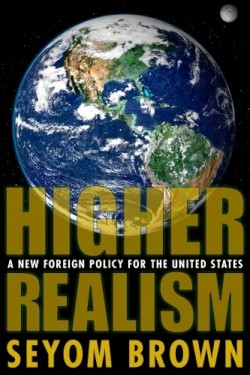Higher Realism
A New Foreign Policy for the United States
Politicians boast about spreading democracy. Armed forces clash. Civilians suffer and die. Pundits debate. Solutions are illusive. Another grand plan collapses into rubble. In the season of political change, many books have appeared with analysis and policy proposals written to advise the new U.S. president.
Seyom Brown’s approach in Higher Realism is to focus on a guiding philosophy to organize foreign policy. Brown is the John Goodwin Tower Distinguished Chair in International Politics and National Security Director of Studies at the Tower Center for Political Studies at Southern Methodist University, has held positions at the RAND Corporation, and is presently a Senior Advisor at MIT’s Security Studies Program. His previous books include The Illusion of Control: Force and Foreign Policy in the 21st Century and Human Rights in World Politics.
The principle of Higher Realism “…does not assume that what is good for the United States is, by definition good for the world. But it does recognize that, more and more, what is good for the world is good for the United States.“ A well-functioning global economy, a healthy planet, respect for cultures and religious traditions, reducing the use of military force, and lessening poverty and diseases in poorer countries have not always been priorities for the foreign policy goals of the U.S. However, Brown argues that in the new epoch of trans-continental immigration, massive globalization, interconnected national economies, and the proliferation of weapons of mass destruction (particularly nuclear weapons), these interests are vital to the continuing strength and health of the U.S.
Brown’s outlook is based on his analysis of the change from a bipolar world that revolved politically around the U.S. and the U.S.S.R., to a poly-polar world of traditional states, alliances (like the European Union), emerging economies (like China and India), and non-state actors (like Al-Qaeda and Hezbollah). In a multi-polar world, actions ripple, rife with unintended consequences.
In their new book Perilous Power: The Middle East and U.S. Foreign Policy: Dialogues on Terror, Democracy, War, and Justice, Noam Chomsky, MIT Linguistics professor and prolific writer whose books include 9-11 and Failed States, and Gilbert Achcar, professor at the University of London’s School of Oriental and African Studies and author of The Clash of Barbarisms and The 33-Day War, reissue their extended conversation about the nature and history of Middle East conflicts and U.S. foreign policy.
Taken together, these two books provide background and several possible paths for the next administration to take in foreign relations and the resolution of international conflicts. The wars in Iraq and Afghanistan, the fears of a new pandemic, global warming, the prolifera-tion of nuclear weapons, hunger-driven food riots, the Israeli-Palestinian conflict, and the worldwide financial crisis are events that will touch each and every one of us. These authors feel strongly that it is in the interest of humanity that U.S. foreign policy catches up with that reality. Foreign policy experts and ordinary readers will benefit from deeply analytical studies like these. (October/November)
Reviewed by
Aaron Brooks
Disclosure: This article is not an endorsement, but a review. The publisher of this book provided free copies of the book to have their book reviewed by a professional reviewer. No fee was paid by the publisher for this review. Foreword Reviews only recommends books that we love. Foreword Magazine, Inc. is disclosing this in accordance with the Federal Trade Commission’s 16 CFR, Part 255.

